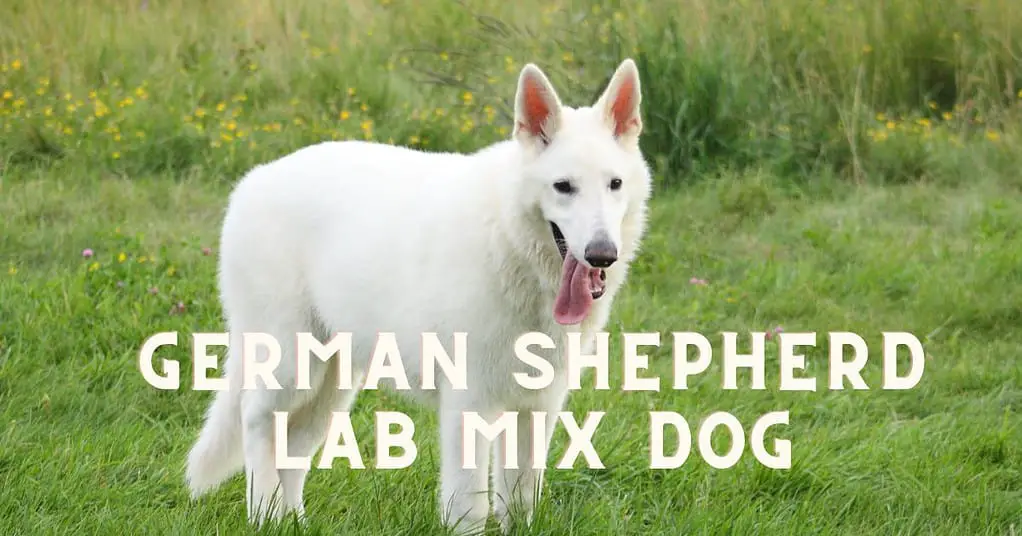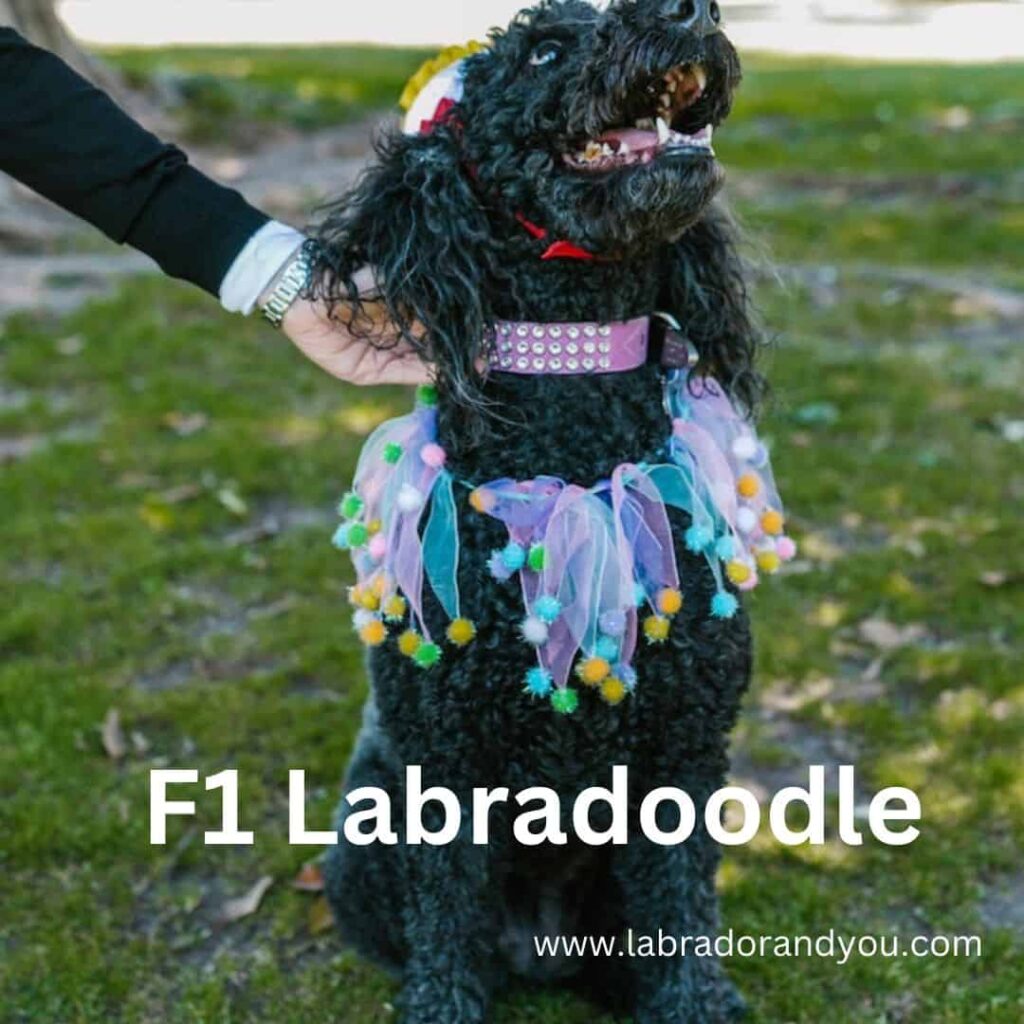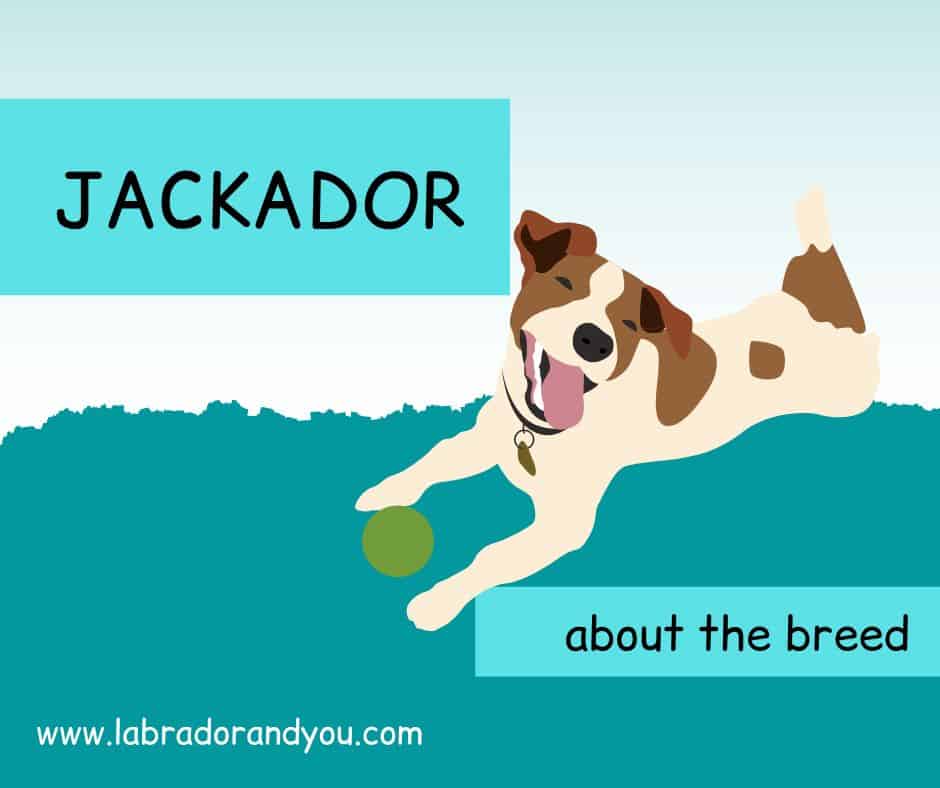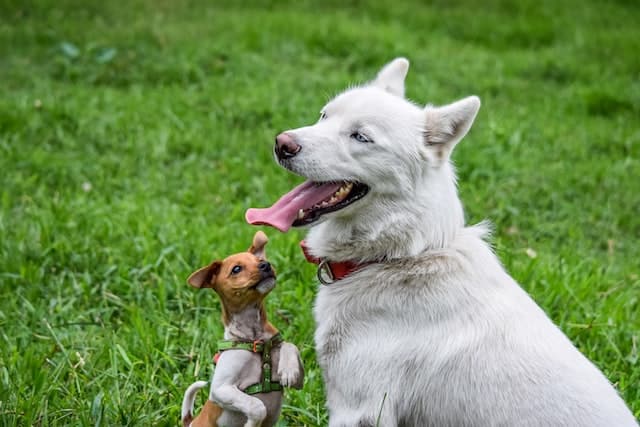The Dalmatian Lab mix, also known as the Dalmadoodle or Dalmatador, is a popular crossbreed dog that blends the gentle, friendly nature of the Labrador Retriever with the energetic, outgoing personality of the Dalmatian. This mixed breed tends to be highly active and needs plenty of exercise and mental stimulation. Most inherit the Lab’s devotion and eagerness to please their owners.
They have a short, dense coat that sheds moderately and comes in various colors and spotting patterns. Their high intelligence makes them fairly easy to train, though their mischievous streak requires early socialization and obedience training.
Origins of the Dalmatian Lab Mix
The Dalmatian Lab Mix, also known as the Dalmador, is a crossbreed between the Labrador Retriever and the Dalmatian breeds.
The Dalmatian
Originating from Croatia’s historical region of Dalmatia, the Dalmatian is a distinctly spotted breed known for its unique appearance. Renowned as one of the most versatile dogs, this breed has excellently served roles such as sporting dog, trail hound, bird dog, and guard dog throughout history.
Characterized by their robust and athletic build, these dogs are full of stamina and endurance, making them exceptional jogging partners or family pets. Not just physical allure – their spirit and immense loyalty towards their human companions make them stand out among other breeds.
The Labrador Retriever
The Labrador Retriever, known for its easygoing friendliness and gentleness with children, is an iconic breed that originated in Newfoundland. Known as a ‘Labrador’ or simply a ‘Lab,’ this breed won hearts worldwide due to its sociable nature and robust energy levels.
As one of the most popular dog breeds in the USA, Labs are excellent family pets and excel in search and rescue operations, assistance dogs for people with disabilities, and therapy dogs.
Their sturdy build allows them to keep pace with active families easily. The coat of a Lab comes in three main colors: black, yellow, and chocolate. These pooches demand well-balanced nutrition like high-quality kibble not just because they’re athletic but mainly to avoid issues like obesity and joint problems.

Physical Features of a Dalmatian Lab Mix
The Dalmatian Lab Mix, also known as the Dalmador, is a medium to large-sized dog with a height range of 20-24 inches and weighs between 50-80 pounds.
Size
The size of a Dalmatian Lab mix, also known as a Dalmador, can vary significantly based on the traits they inherit from their Labrador Retriever and Dalmatian parents. Usually falling into the medium or large category of dogs, these mixed breeds can weigh between 35 to 80 pounds.
It’s noteworthy that English Labradors usually tip towards the heavier end of this scale. With an athletic build that further emphasizes their robustness, you’ll often find them full of energy and always ready for physical activity.
Coat
The Dalmatian Lab Mix, known as the Dalmador, has a short and dense coat. This makes them relatively low-maintenance when it comes to grooming. Their coat colors can vary, with solid black, yellow, chocolate, or white being common options.
Sometimes, they may have spots in black or liver on their coat. Due to their short coat length, regular brushing is usually sufficient to keep their fur neat and tidy. Additionally, bathing should only be done as needed to avoid drying out their skin.
Overall, the Dalmador’s coat is stylish and easy to care for – a perfect combination for busy pet owners!

Personality and Temperament of the Dalmatian Lab Mix
The Dalmatian Lab Mix, also known as the Dalmador, is a highly sociable and affectionate breed that gets along well with families and other pets.
Interaction with Families
The Dalmatian Lab Mix, also known as the Dalmador, is a wonderful breed for families seeking an interactive and devoted companion. These dogs thrive on human interaction and enjoy being part of a family unit. They are known for their even-tempered nature and gentle disposition, making them great with children of all ages.
The Dalmador is highly sociable and loves to be part of all family activities, whether going for a hike or simply snuggling up on the couch. Their affectionate nature ensures that they form strong bonds.
Compatibility with Other Pets
The Dalmatian Lab Mix, or Dalmador, is known for its excellent compatibility with other pets. This hybrid breed’s tolerant and companionable nature makes it a great addition to households with existing animals.
Dalmadors get along well with other dogs and horses, showcasing their ability to form positive relationships with larger animals. They are also generally suitable for families and children, although supervision is advised due to their size and energy levels.
With proper socialization and obedience training, the Dalmador can easily adapt to living harmoniously alongside other beloved pets in your home.
Care and Maintenance of the Dalmatian Lab Mix
The Dalmatian Lab Mix requires a balanced diet to maintain energy levels and overall health. Regular exercise is essential for this active breed, as they have high energy needs.
Regular grooming sessions are also necessary to keep their short coats looking their best and prevent skin allergies or irritations.
Dietary Requirements of dalmatian and lab mix
The Dalmatian Lab Mix, or Dalmador, has specific dietary requirements to ensure their overall health and well-being. Here are some important points to keep in mind when it comes to feeding your Dalmador:
Provide a well-balanced diet:
The Dalmador should be fed high-quality dog food specifically formulated for their age, size, and activity level. Look for dog food that contains real meat as the first ingredient, and avoid artificial additives.
Control portion sizes:
Dalmadors can be prone to overeating, so carefully measure their food portions and avoid free-feeding. Consult with your vet to determine the appropriate amount of food based on your dog’s weight and activity level.
Avoid table scraps:
While it can be tempting to share leftovers with your furry friend, it’s best to avoid giving them table scraps as this can lead to obesity and digestive issues. Stick to their regular dog food for meals and treats specifically for dogs.
Monitor weight:
Keeping an eye on your Dalmador’s weight is crucial for their overall health. Obesity can lead to various health problems, such as joint issues and heart disease. If you notice your dog gaining or losing weight excessively, consult your vet for guidance on adjusting their diet.
Provide fresh water:
Make sure your Dalmador always has access to clean drinking water throughout the day. Hydration is essential for proper digestion and overall health.
Consider special dietary needs:
Some Dalmadors may have specific dietary needs or allergies. If you suspect that your dog has any food sensitivities or allergies, consult with your veterinarian who may recommend a specialized diet or conduct allergy testing.
Regular feeding schedule:
Establishing a regular feeding schedule helps promote healthy digestion and prevents begging behavior. Aim for two meals daily at consistent times that fit into your daily routine.

Grooming Needs
The grooming needs of the Dalmatian Lab Mix, or Dalmador, are relatively low maintenance. Here are some key points to know about grooming this hybrid breed:
- The Dalmador has a short and dense coat that requires regular brushing once or twice a week to remove loose fur and keep the coat looking neat.
- Regular ear cleaning is essential for the Dalmador to prevent ear infections. Use a veterinarian-recommended ear cleaner and gently wipe the inside of the ears with a cotton ball.
- Nail trimming should be done regularly to maintain proper foot health. Long nails can cause discomfort and even lead to joint issues. If you’re uncomfortable trimming your dog’s nails, consider having them by a professional groomer or veterinarian.
- Dental hygiene is crucial for the overall health of your Dalmador. Brush their teeth regularly with a dog-specific toothbrush and toothpaste to prevent tartar buildup, gum disease, and bad breath.
- Bathing requirements for the Dalmador will depend on their individual coat type. Some may need more frequent baths if they have inherited the Labrador Retriever’s oily skin, while others may require less frequent bathing.
Health and Wellness of the Dalmatian Lab Mix
The Dalmatian Lab Mix is generally a healthy and robust breed, but like any dog, they can be prone to certain health conditions. Regular exercise and a well-balanced diet are important for maintaining their overall wellness.
Monitor their weight to prevent obesity, as excess weight can lead to joint problems such as hip dysplasia or arthritis. This mix may be predisposed to deafness, kidney and bladder stones, skin allergies, progressive retinal atrophy (PRA), epilepsy, and gum disease.
Regular veterinary check-ups and early detection of any potential health issues are essential for ensuring the long-term health of your Dalmatian Lab Mix companion.
Common Health Conditions of lab dalmatian mix
The Dalmatian Lab Mix may be prone to certain health conditions due to its genetic makeup. Potential owners must be aware of these conditions and take appropriate measures to ensure their pet’s well-being. Here are some common health conditions that Dalmatian Lab Mixes may experience:
Hip Dysplasia:
This condition occurs when the hip joint does not develop properly and can cause pain and mobility issues. Regular exercise, weight management, and joint supplements can help reduce the risk.
Obesity:
Labradors are notorious for their love of food, and this trait can be passed down to Dalmatian Lab Mixes. Obesity strains the joints and organs, so monitoring their diet and providing regular exercise is crucial.
Deafness:
Dalmatians are often associated with deafness, and this trait can also occur in Dalmatian Lab Mixes. Regular hearing exams and training techniques tailored for deaf dogs can help manage this condition.
Skin Allergies:
Both Dalmatians and Labradors can have sensitive skin that is prone to allergies. Environmental triggers or certain ingredients in food can cause itching and irritation. A high-quality diet, regular grooming, and avoiding known allergens can mitigate the symptoms.
Progressive Retinal Atrophy (PRA):
PRA is a degenerative eye disease that affects both breeds involved in the mix. It leads to gradual vision loss over time, eventually resulting in blindness. Regular veterinary check-ups are important for monitoring eye health.
Arthritis:
With their active nature, Dalmatian Lab Mixes may be prone to developing arthritis as they age. Maintaining a healthy weight, providing joint supplements if necessary, and avoiding excessive strain on their joints can help alleviate symptoms.
Exercise Needs of lab and dalmatian mix
Dalmador mixes have high exercise needs and require daily physical activities to keep them healthy and happy. Here are important facts about the exercise needs of Dalmador mixes:
- Adult Dalmador mixes should receive at least 2 hours of exercise every day to ensure they burn off their energy.
- On the other hand, puppies need around 30 – 45 minutes of exercise daily to help with their growth and development.
- Regular exercise helps prevent obesity in Dalmadors, as they are prone to weight gain if not given enough physical activity.
- Taking your Dalmador for long walks, runs, or hikes is a great way to fulfill their exercise needs while also providing mental stimulation.
- Interactive play sessions, such as fetch or agility training, can help keep your Dalmador mentally engaged and physically active.
- A fenced-in yard or access to open spaces is ideal for Dalmadors so they can safely run and play off-leash.
- Engaging in activities like swimming or playing with other dogs can be a fun way for your Dalmador to get the exercise they need.
- Mental stimulation is just as crucial as physical exercise for Dalmadors, so consider incorporating puzzle toys or obedience training into their routine.
- Remember that regular exercise keeps your Dalmador fit and helps prevent behavioral issues arising from pent-up energy.
Training the Dalmatian Lab Mix
Training the Dalmatian Lab Mix is an enjoyable and rewarding experience. With their intelligence and eagerness to please, these dogs are highly trainable. Start training your Dalmador from a young age using positive reinforcement methods such as treats, praise, and play.
Consistency is key to ensuring that they understand what behavior is expected of them. Focus on basic obedience commands like sit, stay, come, and leash training. Socialization is also crucial for this breed to help them feel comfortable around people and other animals. Regular exposure to different environments will help prevent any potential anxiety or fearfulness.
Due to their high energy levels, providing plenty of physical exercise and mental stimulation through activities like interactive games or puzzle toys is important. Engage in regular play sessions where they can run free in a securely fenced yard or take them for long daily walks.
Remember that each dog has its own individual temperament and may require slightly different training approaches. By investing time into proper training early on, you’ll have a well-behaved companion who loves learning new tricks while being a joy to be around for the whole family.

Do Dalmatian Lab Mixes make Good Family Pets?
Dalmatian Lab mixes, or Dalmadors, make wonderful family pets. Their sociable and even-tempered nature makes them a great addition to any household. These dogs love being around people and thrive in a loving and active family environment.
Dalmadors are known for their compatibility with children and other pets. They have a patient and gentle demeanor around kids, making them ideal companions for families with young ones.
These dogs often get along well with other animals, including dogs and horses. They have an innate ability to form strong bonds with humans and animals.
One important aspect of owning a Dalmador is providing them with ample exercise opportunities. These energetic dogs require daily physical activity to stay happy and healthy. Fortunately, they adapt well to outdoor environments and are at their best when given space to run around in a fenced-in yard or taken on long walks or hikes.
In conclusion, the Dalmatian Lab mix is an excellent choice if you’re looking for a friendly, affectionate, and trainable dog that will fit seamlessly into your family dynamic.
Their sociability towards people of all ages and their compatibility with other pets make them perfect companions for families seeking an active four-legged friend.

FAQs
What are the characteristics of a Dalmatian Lab mix?
A Dalmatian Lab mix inherits traits from both breeds, including intelligence, loyalty, and friendly nature. They tend to be medium-sized dogs with short coats that may display spots like a Dalmatian or have solid colors like a Labrador Retriever.
How much exercise does a Dalmatian Lab mix need?
Dalmatian Lab mixes are energetic dogs requiring regular exercise to stimulate them physically and mentally. Daily walks, playtime in the yard, and interactive games are recommended to help burn off their energy.
Do Dalmatian Lab mixes have any specific health concerns?
Like all dog breeds, Dalmatian Lab mixes may be prone to certain health issues inherited from their parent breeds. Some potential concerns include hip dysplasia, deafness (more common in purebred Dalmations), and obesity if not properly exercised and fed a balanced diet.
Are Dalmatians related to labs?
Dalmatians and Labradors are not closely related but share some common ancestors. Both breeds are descended from hunting dogs and have a high energy level and a friendly temperament.
Are Dalmatians loyal dogs?
Dalmatians are generally considered to be loyal dogs. They are very attached to their families and can be protective of them. However, they can also be independent and stubborn at times.
Are Dalmatians safe dogs?
Dalmatians are generally considered to be safe dogs. They are not known for being aggressive or dangerous. However, they can be somewhat wary of strangers, and they may bark at them.
How strong is a Dalmatian bite?
The bite force of a Dalmatian is about 230 PSI, which is about average for a medium-sized dog.
Which dog lives longest?
The average lifespan of a Dalmatian is 10-13 years. The average lifespan of a Labrador is 10-12 years.
Do Dalmatians bark?
Yes, Dalmatians bark. They are known for their loud, deep barks.
Author Profile
- Site Owner And Dog Lover
-
Aritra, the founder of Labradorandyou.com, is a lifelong dog lover whose passion ignited for Labradors for their loyalty and intelligence. With extensive research and personal experiences, Aritra has become a Labrador expert, offering a rich resource on the breed. Labradorandyou.com provides reliable, timely, and evidence-based information, including Labrador-specific product reviews, training techniques, and care tips.
Labradorandyou.com was born out of Aritra's passion and his desire to share his profound knowledge about the breed. The site serves as a comprehensive resource, offering a wealth of up-to-date information for Labrador owners and enthusiasts alike
Also by the author
-
 Lab-TypesNovember 17, 2023Old Dog Seizures: Causes, Symptoms, and Treatment Options
Lab-TypesNovember 17, 2023Old Dog Seizures: Causes, Symptoms, and Treatment Options
-
 Lab-TypesNovember 17, 2023Why Is My Dogs Poop Yellow? 8 Reasons & Solutions
Lab-TypesNovember 17, 2023Why Is My Dogs Poop Yellow? 8 Reasons & Solutions
-
 ReviewsNovember 17, 2023The Only Hill’s Science Diet Review You Need To Read
ReviewsNovember 17, 2023The Only Hill’s Science Diet Review You Need To Read
-
 Lab-TypesNovember 17, 2023How To Adopt An Emotional Support Dog?
Lab-TypesNovember 17, 2023How To Adopt An Emotional Support Dog?





